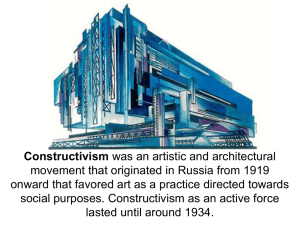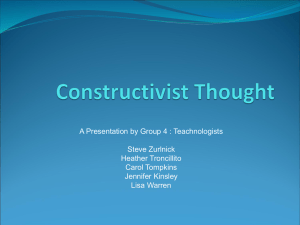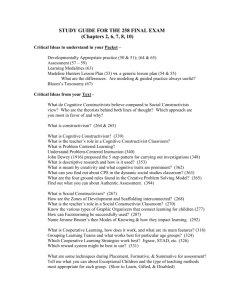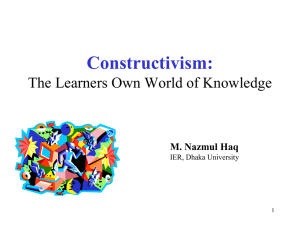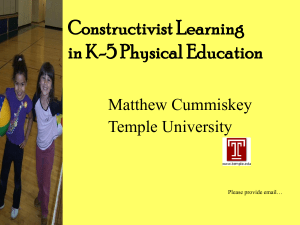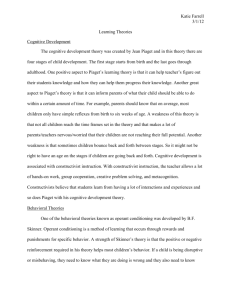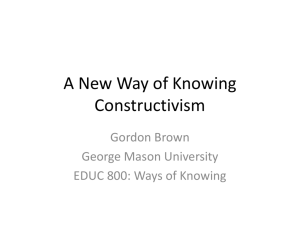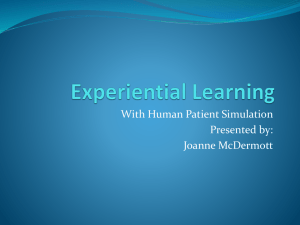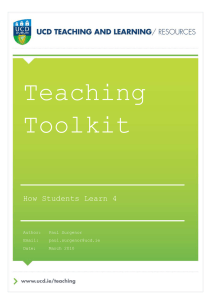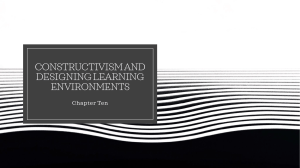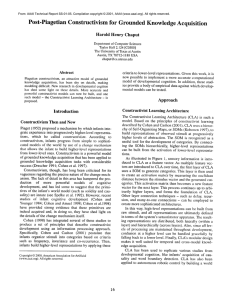Day 6 Constructivism part 2
advertisement
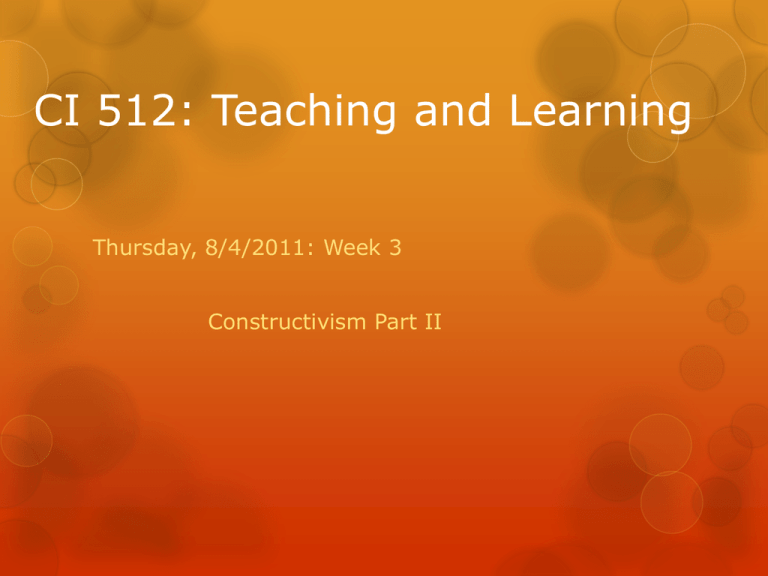
CI 512: Teaching and Learning Thursday, 8/4/2011: Week 3 Constructivism Part II Class Outline: Constructivism Note Taker: Mike Povosky Observer: Greg Richard Logistics (9:00-9:05) Constructivist Theory (9:05-9:15) Small Group Discussion (9:15-9:45) Whole Class (9:45-10:15) Break (10:15-10:25) Principles of Group Participation (10:25-10:45) Project Work Time Small Group (10:45-11:30) Share Out (11:30-11:40) Observer Observations (11:40-11:45) Conclusions and Exit Cards (11:45-11:50) Snap Shots Reflections Many snap shots could be strengthened by adding more specific descriptions of theory Specify who’s version of constructivism you are using for your analysis Please ask if you have questions about my comments APA Internal Citations When making reference to an author’s name, cite the date after the name: Ex. According to Labato (2003) actor-oriented transfer has advantages over traditional views of transfer. When making reference to a source without using the author’s name, cite the author’s name and date at the end of the paragraph: Ex. Paiget describes 4 stages of cognitive development (Phillips & Soltis, 2009). When quoting directly, include author’s name, date, and page number. Put the quotation marks before the citation and a period after: Ex. As Paiget explains, “It is probably possible to accelerate, but maximal acceleration is not desirable” (Resnick & Ford, 1981, p. 178) Exit Card Reflections One student asked for a shorted break– another asked for a longer break. Vote? Today’s class will focus on Brooks & Brooks Clarity on the connection between Piaget and Constructivism Some are starting to feel the pressure of 3 classes Constructivist Theories (Ernst, 1996) A plurality of theories: occasionally in opposition with one another Basic premise that learning is a constructive process Vocabulary Ontology- theory of existence Epistemology- theory of learning and the nature of knowledge Pedagogy- theory of teaching, the means to facilitate knowledge Weak Constructivism All individual human knowledge is individually constructed The mind is a data-processing computer, however all data is self constructed There exists a realm of objective knowledge Local paradigm: only accounts for the knowledge representations of individuals Weak Constructivism “Learning is then characterized as a process in which students gradually construct mental representations that accurately mirror the mathematical features of external representations.” Cobb, Yackel & Wood (1992). A constructivist alternative to the representational view of the mind in mathematics education. Journal for Research in Mathematics Education 23(1) p. 3. Social Constructivism Individuals are “the realm of the social” as inextricably interconnected No metaphor for the isolated individual mind: must be viewed in terms of its interactions Meaning is socially constructed and constrained by the shared experiences of the underlying physical reality Socially constructed meaning seeks to represent the ontological reality, which will never be fully attained Modified relativist ontology: “There is a world out there supporting the appearances we have shared access to, but we have no certain knowledge of it” (pg. 343) Radical Constructivism von Glasersfeld (1917-2010) Cognition is adaptive Only concerned with the experiential world and not an ontological reality Experiencers of the world construct understanding based upon perception as opposed to inaccessible reality Neutral in ontology: not concerned with the existence of objective world Language serves as an imperfect mediator between unknowable minds Fish is Fish Leo Lionni Small Group Discussion How does Fish is Fish story relate to the constructivist paradigm? What are the limitations of language for understanding the mental constructs of others? What are ways to resolve the problems of language? Discuss the merits of Brooks & Brooks’ argument for a constructivist classroom. What are some critiques? Pick 4 (or more) principles of “constructivist teaching” outlined in chapter 9. Discuss the strengths and weaknesses of each of the principles? How might you see them enacted in your future classrooms? Break Group Presentations 4-5 people (next slide) 20-30 minute teaching/learning activity on a topic of the groups’ choice Draw upon at least two different learning theories YOUR CHANCE TO SHOW THEORY IN ACTION! Feel free to draw upon pre-existing curriculum and resources Illuminations.nctm.org Metropolitan Instructional Support Lab (3rd floor) Math Resource Lab Neuberger 305 Group Presentation Write-up It is a GROUP presentation and an INDIVIDUAL write-up 1. A description of how the lesson relates to teaching/learning theories (1-2 pages) 2. A personal reflection on what you learned and how this project will impact your future teaching (1-2 pages) 3. An evaluation of every group member (including yourself) based upon the principles of group participation created by the class community. Group Presentation Individual write-ups are due the date of your presentation 20 points are based on the presentation 50 points based on the write-ups 10 points based on group member evaluations Principles of Group Participation In groups of 3 or 4, brainstorm a list of principles of group participation that you wish to be evaluated against Each principle should be ratable on a scale from 1 to 5 (1 means I don’t agree, 5 means I agree strongly) Example: This group member was always happy 1 2 3 4 5 Decide upon your top three principles and list them on this sheet. Remember, these are the criteria that both you and your group mates will be held accountable to. Group Presentation Groups Present Tues. 8/16 Present Thurs. 8/18 Group 1 Group 2 Group 3 Group 4 Group 5 Mike P. Mike T. Carlos Westie Greg Nick Michael Casey Laura Kyle Colin Arielle Martin Mike M. Chai Teale Iman Sean Chad Karen Derek Group Projects Goals: Topic Concrete sources PLEASE WRITE DOWN YOUR SOURCES!! Resources: Illuminations.nctm.org Metropolitan Instructional Support Lab (3rd floor) Math Resource Lab Neuberger 305 Observations Exit Card Reflections Rate your level of participation today (0-3) Name one thing that you learned today Name one thing you are struggling with or would like to know more about
